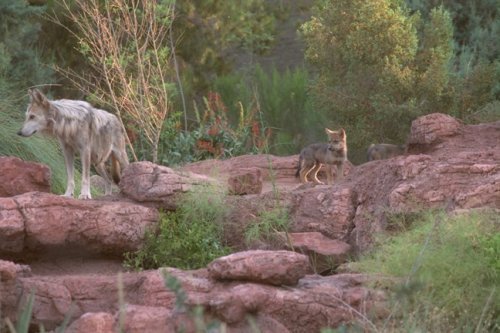New In the Press: Wolf is unique in maintaining ecosystem health
By Kirk Robinson
 In his commentary “Management of wolves needs to be left up to the states” (Opinion, Oct. 16), Don Peay argued that the Endangered Species Act should be rewritten to exclude gray wolves from endangered species protection throughout the United States.
In his commentary “Management of wolves needs to be left up to the states” (Opinion, Oct. 16), Don Peay argued that the Endangered Species Act should be rewritten to exclude gray wolves from endangered species protection throughout the United States.
This would include all wolves in the northern Rockies and the upper Midwest, as well as the struggling Mexican gray wolf population in the Southwest which illegal killing has reduced to a mere 42 individuals.
The reason Peay gave for this startling proposal is essentially that hunters have a proprietary right to wildlife. They can shoot trophy elk for wall decorations because they buy licenses and pay excise taxes on hunting equipment, but it is unacceptable for wolves to eat elk to survive.
Wolves do eat elk and deer, and occasionally cows and sheep. But surely this cannot be a good reason to discriminate against this one species, excluding it from federal protection at the behest of special interests and in total disregard of science.
Peay asked the Utah Wildlife Board to endorse two federal bills that will do exactly this. And in a meeting on Oct. 19, they obliged him. The seven geriatric white male members of the Wildlife Board voted unanimously to endorse Sen. Orrin Hatch’s S. 3919 and H.R. 6028, endorsed by both Reps. Jim Matheson and Jason Chaffetz. Never mind that there is not a single shred of science to support these bills or that their passage would set an egregious precedent.
There is no other species of animal on the continent capable of occupying the supremely important role of wolves in maintaining ecosystem health. Hunters can’t do it. They don’t alter the behavior of ungulates in the way wolves do (dubbed “the ecology of fear”), and they generally select for completely different classes of animals (robust adults as opposed to small, sickly or weak animals). As a result of replacing wolves with hunters we have deteriorating watersheds, biological impoverishment, and diseases spreading through game populations.
What an irony! The animal species most maligned, vilified and persecuted by human beings turns out to be necessary to the very health of the land on which we too depend.
It is a fact not yet recognized in our lore or our ethics.
Here are more facts:
Coyotes have been documented to kill 20-30 times more sheep and 20-30 times more cows than wolves do, and they eat a lot of deer and elk, too. Wolves will permanently cut coyote populations in half practically for free.
There were 16 percent more elk in the northern Rockies in 2009 than there were in 1995 when wolves were reintroduced.
There are only 1,700 wolves, compared to half a million elk and a couple of million deer, in the northern Rockies gray wolf recovery area, which is larger than the state of Texas.
A recent 10-year study showed that the moose population in western Wyoming grew too large because of lack of predation, and then collapsed almost entirely due to poor nutrition. If wolves had been reintroduced earlier, they might have prevented this.
Wolves occasionally eat a cow or sheep, but wolf depredation accounts for less than 1 percent of total losses in the northern Rockies. In Idaho one year, the numbers of livestock killed by dogs and wolves, respectively, were 1,400:270 sheep and 100:20 cows.
So far as researchers have been able to document, wolves have killed only two people in North America since 1900, while cougars have killed 22 and black bears have killed 61. Dogs have killed 345 people in Canada and the United States since 1982.
Kirk Robinson is executive director of the Western Wildlife Conservancy.
This opinion editorial was published in the Salt Lake Tribune on October 30, 2010.
Please submit a letter to the editor of the Salt Lake Tribune supporting the writer’s points about the immense importance of wolf recovery to western lands: letters@sltrib.com (NO attachments please).



